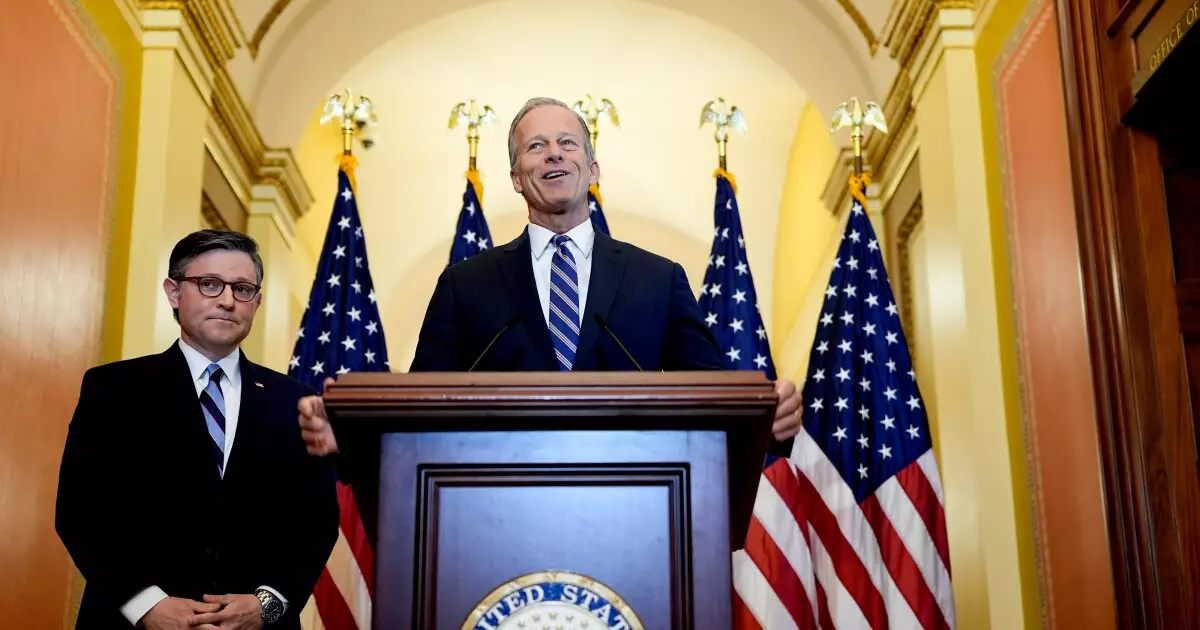As President Trump celebrated the narrow passage of his much-hyped “big beautiful bill” in the House of Representatives, it’s important to take a closer look at the implications of this legislation beyond the headlines. The number 216-214 may sound like a victory, but it masks a deeper concern: the illusion of fiscal responsibility. Republican leaders trotted out promises of $1.5 trillion in spending cuts, yet many are skeptical that this will ever materialize. A number of Republican lawmakers expressed fears that this bill could pave the way for greater deficits, even as it claims to “rein in” spending. It’s an odd juxtaposition—officials asserting their commitment to fiscal conservatism while simultaneously creating a pathway for unprecedented financial irresponsibility.
When scrutinizing the surface-level rhetoric, one can’t help but notice that this bill represents a classic case of political posturing. Legislators may well be hoping to placate conservative members of their party with promises that seem substantial yet remain vague. By simply suggesting that deeper cuts will happen later in the process, they are not committing to any real accountability. Instead, there’s a sense of theater at play—Republicans attempting to appease bold and often contradictory demands, all while not making substantive plans for true fiscal restraint.
Tax Cuts that Don’t Cut the Mustard
The proposed legislation extends the Tax Cuts and Jobs Act (TCJA) but does so with additional complexities, such as allowing for $4 trillion in tax cuts that are contingent upon nebulous commitments to spending reductions. The rhetoric surrounding tax cuts often stirs excitement among the electoral base. However, the reality is far grimmer. With a staggeringly ambitious $5 trillion price tag, one must ask: at what cost are these tax cuts being delivered? If the fundamental issue remains unchecked, we could find ourselves in a situation where the government not only fails to cut back on spending but also increases the tax burden in other areas to recover lost revenues due to these exorbitant cuts.
This raises questions around the sustainability of the proposed tax relief. Are these cuts designed to stimulate the economy or merely a vote-baiting strategy for the next election cycle? When the conversation shifts towards larger deficits, one begins to suspect that this legislation is not about fostering economic growth but rather an attempt to maintain power at all costs. This predicament highlights a moral crux that is seldom discussed: the dignity and integrity of governance must sometimes outweigh political ambitions.
A Pandora’s Box of Fiscal Recklessness
The dissent expressed by Representatives Thomas Massie and Victoria Spartz should serve as a vital warning to other lawmakers. Spartz’ description of opening a “Pandora’s box” should not be taken lightly. By changing accounting rules to obscure ongoing and future budgetary deficits, the GOP leadership risks stripping the fiscal fabric of America. Such actions undermine core fiscal principles and set dangerous precedents for future governance.
Structural changes to accounting practices for political gain are troubling. Momentum toward fiscal responsibility diminishes when such practices are enacted, making meager cuts appear effective while evading the real issues that need addressing. Instead of confronting the underlying problems of waste and inefficiency in government spending, lawmakers are opting for shortcuts that avoid hard truths and ethics.
The Political Game of Evasion
Even as partisan divides seem insurmountable, this moment in governance reveals another layer of cynicism— a game of evasion where neither side presents a genuine solution to the issues at hand. Voters may find themselves trapped in a cycle where they are continuously promised relief but receive little more than empty words. Leaders in both parties need to cut through the noise and engage in a forthright dialogue about fiscal realities, something plainly absent in this recent legislative jockeying. By kicking the can down the road, they make matters worse, paving the way for more significant economic pain down the line.
Political machinations aside, the focus should rightly be on the American people’s welfare. Wouldn’t it be refreshing to see a governing body that prioritizes responsibility over popularity? A concerted effort to hold one another accountable for financial decisions would benefit everyone—not just those in power. The challenge now lies in whether lawmakers can break free from self-serving inclinations, ushering in an era of genuine fiscal reform that binds them to a commitment to the nation rather than their careers.

